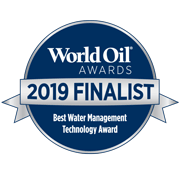Produced Water Treatment and Recycling
From automated water recycling systems that economically process produced water to providing on-the-fly water treatment technologies that eliminate bacteria and sulfides prior to fracturing operations, we help ensure consistent water quality throughout completion operations.
Since 2020, TETRA recycled nearly 13 billion gallons of produced water for reuse in well operations. We also provided on-the-fly water treatment for water which helps eliminate bacteria and sulfides prior to completion activities.
A key challenge for operators is the wide variance in water quality and consistency. Addressing this challenge requires planning to determine the water treatment process and to what level before using it in fracturing operations. Our automated water treatment and recycling systems are developed specifically to handle the high variability inherent in non-potable water supplies, including subsurface saline water, produced water, and effluent water.

Selective chemical treatment, filtration, and blending from TETRA work together to provide water that is free of bacteria and scale forming solids before pumping it downhole. Our custom-designed, patented blending manifold delivers consistent, homogeneous frac water and allows dispersion of additives ahead of the working tanks. Water treatment chemicals and additives are fast acting, quick degrading, selective biocides that eradicate bacteria as frac water moves through the tanks.
We recommend our filtration technology for polishing brines, gels, chemicals, and produced water in completion, stimulation, and workover operations. The systems are designed for high rates and high volumes and are meant to keep pace with today’s current stimulations. Our filtration capabilities can process fluids containing a high percent by volume of suspended solids.
Our units economically filter large fluid volumes at rates greater than 60 bpm and do not require additional personnel on location. Real-time adjustments ensure treatment specifications are achieved. Complete pre- and post-job water analyses are available through our laboratory services.
Automated Water Treatment & Recycling
 SwiftWater Automated Treatment (SWAT) System
SwiftWater Automated Treatment (SWAT) System
The SWAT system chemically treats produced water through a clarification process that enables recycling in excess of 100,000 bbl/day of produced water. We build custom systems to handle any volume requirement. Our BlueLinx web-based, real-time monitoring and control technology gives you 24/7 access to treatment and recycling operations. This provides a transparent and on-demand view of the chemistry applied to treat the water and its effectiveness. Through the BlueLinx technology, our recycling service is integrated with other TETRA water management services.
Our SWAT system consists of the following technologies and processes:
- Automated chemical injection into influent produced water stream
- The clarification process employs dissolved air flotation technology (DAF)
- The treated produced water is polished through a low media consumption filtration technology
On-the-Fly Water Treatment
Our on-the-fly water treatment system processes both the produced and fresh water with EPA-approved biocides to prevent or eliminate 100 percent of bacteria. Biocides remove bacteria and sulfides prior to fracturing, providing continuous, accurate chemical dosage volume. Because the water system generates biocides through the flow of water in the transfer line, the unit stops when flow stops to ensure a safe working environment.
Automated Recovery of Residual Hydrocarbons
TETRA Oil Recovery After Production Technology (ORAPT)
Our ORAPT oil separation system pretreats produced water before recycling it. Standalone ORAPT mobile units remove native oil, undesired light constituents, and oil slugs caused by unplanned bypasses from production facilities to deliver water with only trace amounts of oil at 50-100 ppm. The recovered oil is returned to the operator for sale. Nominal throughput of this system is up to 28,000 bbl/day.
The Road to Sustainability – Shale Play Water Management – Jan/Feb 2020
Keys to Reducing the Cost of Treating Produced and Flowback Water – E&P / Hart Energy – July 2019
Flowing with the Times – Oilfield Technology – July 2019
Solving the Shale Play Water Conundrum – Shale Play Water Management – Nov 2018
Contact Our Team
Our team is happy to answer your questions or provide detailed information. Fill out the form and we’ll be in touch as soon as possible.


 SwiftWater Automated Treatment (SWAT) System
SwiftWater Automated Treatment (SWAT) System